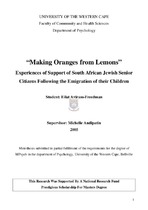| dc.description.abstract | Family is widely expected to be the main source of support for Senior Citizens and, like many religions and cultures, the Jewish tradition has expectations of filial obligations of care. South Africa and its Jewish community have experienced increased emigration over the last decade resulting in many Senior Citizens remaining in South Africa after all their children have emigrated. A phenomenological methodology was used in this study, with the aim of gaining more understanding, firstly about what is experienced by Senior Citizens as beneficial and not beneficial in regards to support in general and secondly about the challenges of later stages of life from Senior Citizens’ perspective, especially without expected support of offspring. In-depth interviews were conducted with eight Jewish women, aged over 75, who find themselves in such a position. Their experiences are described in terms of social, practical, emotional and spiritual support as well as in terms of the contextual experiences that necessitate support. The overall experience was found to be one of managing aloneness and dealing with the loss of family and its accompanying sense of belonging. It includes constantly missing one’s family, trying to keep in satisfyingly regular contact and trying to comprehend, justify and accept their emigration in terms of expected intergenerational roles. It demands adjusting to constant changes in supports and in one’s independence and identity and finding the motivation to strive to remain alive and discover meaning in the painful situation. In the face of all this, there is also a discovery of previously unsuspected new strengths in being able to cope with these difficulties and an exciting new sense of liberation in catering only for oneself. A model of perceived Ideal Support was uncovered comprising a hierarchy of needs within such support, including; Consistency, Reliability, Role Fulfilment, Desire to Support, Respect, Dignity, Enabled Independence, Affection, Like-Mindedness and Belonging. | en_US |

